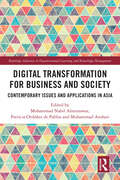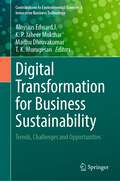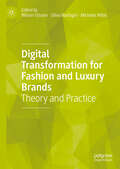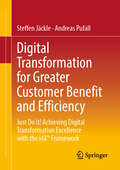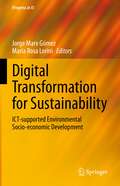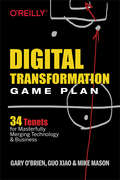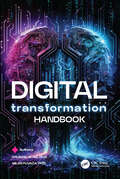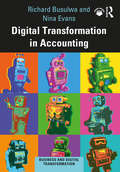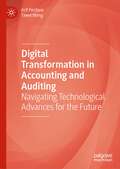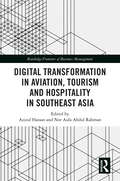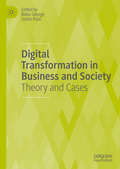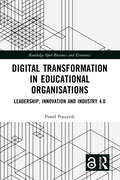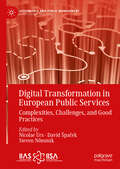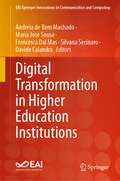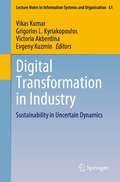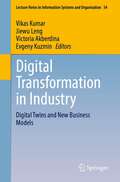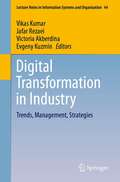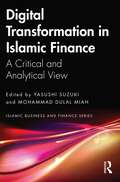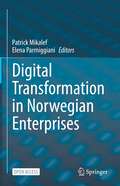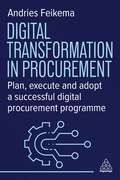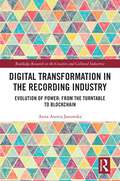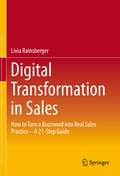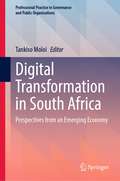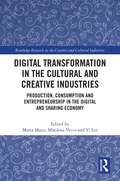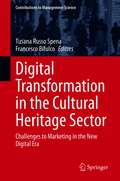- Table View
- List View
Digital Transformation for Business and Society: Contemporary Issues and Applications in Asia (Routledge Advances in Organizational Learning and Knowledge Management)
by Mohammad Nabil Almunawar, Patricia Ordóñez de Pablos and Muhammad AnshariThe advancement of technology, such as data analytics and AI, has led to the birth of Industry 4.0, in which technology seems to be at the centre of development. However, as the COVID-19 pandemic created havoc, the entire world production chain was seriously affected, highlighting that machines alone, although fully connected and automated, cannot function without people. This book addresses contemporary issues and the impact of digital transformation on individuals, businesses and governments in Asia. As Asian nations are moving fast towards the digital economy, this edited collection offers new perspectives on understanding emerging business opportunities as well as the challenges faced. Chapters explore the variables that accelerate digital transformation, notably the COVID-19 pandemic, the rapid development of information and communication technology, AI, big data and affordable internet access, and their impact on business and society. With rich, empirical studies from leading researchers, this book will be a reference for academics and scholars across business disciplines, including information, technology and innovation management, organisational and strategic management, as well as those interested in industrial development.
Digital Transformation for Business Sustainability: Trends, Challenges and Opportunities (Contributions to Environmental Sciences & Innovative Business Technology)
by Aloysius Edward J. K. P. Jaheer Mukthar Madhu Dhruvakumar T. K. MurugesanThis book explores how digital technologies can be used to drive sustainable business practices and achieve long-term business success. It offers insights and practical strategies and guidance that can help businesses adapt to the digital age, optimize their operations, and create new opportunities for growth. The book further provides real-world examples that illustrate how businesses can leverage digital technologies to achieve long-term sustainability and success. The book is an essential read for business leaders, managers, academician, practitioners and entrepreneurs who are looking to drive sustainable digital transformation within their organizations. The book covers a wide range of topics, including:1) Understanding the digital landscape: The book provides an overview of the digital technologies that are transforming business operations, such as artificial intelligence, cloud computing, and the Internet of Things. It explores how these technologies can be leveraged to create sustainable business practices that benefit both the organization and society.2) Building a digital strategy for sustainability: The book offers guidance on how businesses can develop a digital strategy that aligns with their sustainability goals. It covers topics such as identifying digital opportunities, setting targets, and measuring performance.3) Embedding sustainability into digital operations: The book explores how businesses can integrate sustainability into their digital operations, such as data management, supply chain management, and product design. It provides examples of companies that have successfully implemented sustainable digital practices.4) Digital innovation for sustainability: The book discusses how businesses can use digital innovation to create new opportunities for sustainability. It covers topics such as circular economy business models, sustainable product design, and social innovation.5) Leading for sustainable digital transformation: The book offers insights on how business leaders can drive sustainable digital transformation within their organizations. It covers topics such as leadership skills, organizational culture, and stakeholder engagement.
Digital Transformation for Fashion and Luxury Brands: Theory and Practice
by Wilson Ozuem Silvia Ranfagni Michelle WillisThis book re-evaluates the diffusion and positioning of fashion and luxury brands following the impact and disruption of digital transformations, particularly on existing omni-channel models and touchpoints and consumer behaviours. By exploring the importance of digital transformation and discussing the benefits and challenges it has created for the fashion industry, this book provides insights into the role of various digital technologies, systems and strategies in generating and maintaining brand value and equity, customer engagement and experiences and connecting the marketplace and marketspace. Chapter 16 is available open access under a Creative Commons Attribution 4.0 International License via Springer Link.
Digital Transformation for Greater Customer Benefit and Efficiency: Just Do It! Achieving Digital Transformation Excellence with the i4X® Framework
by Steffen Jäckle Andreas PufallDigital transformation is not an end in itself. The focus of this process must always be on enhancing customer benefits and improving the efficiency of service provision. Only in this way can digital transformation be meaningful and successful for companies. The authors of this book demonstrate how transformation excellence can be achieved using the i4X® framework: In four steps—Insight, Ignite, Innovate, and Implement—the systematic execution of digital transformation initiatives takes place. The i4X® framework has emerged from entrepreneurial practice and is scientifically grounded. Numerous examples and illustrations facilitate its application in companies, in line with the authors' motto: Just do it!
Digital Transformation for Sustainability: ICT-supported Environmental Socio-economic Development (Progress in IS)
by Jorge Marx Gómez Maria Rosa LoriniThis book presents case studies to analyse the relationship between sustainability – environmental, social, institutional and economic – and digital innovation. The respective contributions offer a contextualisation of the main present and future trends concerning these two elements, and present analyses from economic, technical, managerial, and social perspectives alike. The individual sections of the book focus on interactions between sustainability and digital innovation in existing organisations and highlight the new opportunities, challenges and threats that may emerge as a result. The contributions are mainly based on case studies and research conducted in Europe and Africa, with a few focusing on Southeast Asia and Central America, and were prepared by experts in the fields of Information Systems, Computer Science, Social Development, and Economics.
Digital Transformation Game Plan: 34 Tenets for Masterfully Merging Technology and Business
by Gary O'Brien Guo Xiao Mike MasonThe Digital Age is having a broad and profound impact on companies and entire industries. Rather than simply automate or embed digital technology into existing offerings, your business needs to rethink everything. In this practical book, three ThoughtWorks professionals provide a game plan to help your business through this transformation, along with technical concepts that you need to know to be an effective leader in a modern digital business.Chock-full of practical advice and case studies that show how businesses have transitioned, this book reveals lessons learned in guiding companies through digital transformation. While there’s no silver bullet available, you’ll discover effective ways to create lasting change at your organization.With this book, you’ll discover how to:Realign the business and operating architecture to focus on customer valueBuild a more responsive and agile organization to deal with speed and ambiguityBuild next generation technology capability as a core differentiator
Digital Transformation Handbook
by Krunoslav Ris Milan PuvačaDigital transformation has become more than a buzzword from the media since companies figured out the importance of rethinking business processes during global challenges. On its own, the term assumes integration of digital technology into all areas of a business, resulting in fundamental changes to how the company operates and delivers value to customers. Taking care of and choosing the optimal ICT tools is a constant struggle; the final decision may depend on the consultant’s experience. Including all business stakeholders in this process is a must. Creating innovative company culture, continuous learning, and developing new skills with flexible and open communication and willingness to experiment are a challenge. This complex, comprehensive approach can include implementing new systems, integrating existing systems, and using data analytics and artificial intelligence (AI) or machine learning to drive better outcomes. By adapting and exploiting digital technology in new ways, businesses can gain better and more detailed customer experiences and build stronger relationships with their clients. In addition, digital transformation can help organizations to be more agile and responsive, which can lead to less time needed for different processes or the ability to adapt quickly to changing conditions. In a time when change is the only constant – and it is hitting us every day not to forget about that – it is essential to think about digital transformation constantly. Technology improvement, availability, and scalability give us no room for excuses for not using them. Who can say that we are not living in dynamic and exciting times? The Authors have taken their 20 years of practical experience and put it into this handbook, in which many cases can be found where not every time is a success story. This book is prepared to provide some insights, give you a fresh overview of what such change can enable, and set up an environment for new technology that will arrive shortly.
Digital Transformation in Accounting (Business and Digital Transformation)
by Richard Busulwa Nina EvansDigital Transformation in Accounting is a critical guidebook for accountancy and digital business students and practitioners to navigate the effects of digital technology advancements, digital disruption, and digital transformation on the accounting profession. Drawing on the latest research, this book: Unpacks dozens of digital technology advancements, explaining what they are and how they could be used to improve accounting practice. Discusses the impact of digital disruption and digital transformation on different accounting functions, roles, and activities. Integrates traditional accounting information systems concepts and contemporary digital business and digital transformation concepts. Includes a rich array of real-world case studies, simulated problems, quizzes, group and individual exercises, as well as supplementary electronic resources. Provides a framework and a set of tools to prepare the future accounting workforce for the era of digital disruption. This book is an invaluable resource for students on accounting, accounting information systems, and digital business courses, as well as for accountants, accounting educators, and accreditation / advocacy bodies.
Digital Transformation in Accounting and Auditing: Navigating Technological Advances for the Future
by Arif Perdana Tawei WangThis book elucidates the digital transformation of accounting by examining the countless challenges academic institutions encounter in the wake of technological progress. This underscores the importance of accountants in enhancing their skill set to align with today’s evolving digital landscape. The text evaluates cutting-edge technologies, such as artificial intelligence, data analytics, and blockchain, exploring their impact on accounting decision-making processes. Through a comprehensive analysis of the intersection between these technologies and diverse industrial sectors, this book illuminates the distinctive challenges and possibilities. The book provides an essential reference for professionals and scholars seeking a thorough understanding of accounting domain in the digital age.
Digital Transformation in Aviation, Tourism and Hospitality in Southeast Asia (Routledge Frontiers of Business Management)
by Azizul Hassan and Nor Aida Abdul RahmanTechnological advances and the drive to digitalize business processes in aviation, tourism, and hospitality have forced the industries to go along with the digital movement. The results are often mixed. This book brings together contributions from leading scholars in the field and explores the digital transformation in these industries in Southeast Asia. The book looks at the impact of digital transformation on the region and the issues and challenges brought about by this transformation. It also addresses trends in the industries from blockchain technology, AI, biometric and mobile technology applications to in-flight catering. It examines the impact of COVID-19 on the industries and how the pandemic has led to businesses adopting new business models. Through the case studies of digital adoptions in the region, readers will gain insights on how the countries have leveraged new technologies and the implementation processes to drive digital transformation. The book aims to help scholars and policy makers understand the digital advances in the industries to better formulate responses in research and policy making and deliver effective digital transformation.
Digital Transformation in Business and Society: Theory and Cases
by Justin Paul Babu GeorgeThe digital traces that people leave behind as they conduct their daily lives provide a powerful resource for businesses to better understand the dynamics of an otherwise chaotic society. Digital technologies have become omnipresent in our lives and we still do not fully know how to make the best use of the data these technologies could harness. Businesses leveraging big data appropriately could definitely gain a sustainable competitive advantage. With a balanced mix of texts and cases, this book discusses a variety of digital technologies and how they transform people and organizations. It offers a debate on the societal consequences of the yet unfolding technological revolution and proposes alternatives for harnessing disruptive technologies for the greater benefit of all. This book will have wide appeal to academics in technology management, strategy, marketing, and human resource management.
Digital Transformation in Educational Organizations: Leadership, Innovation and Industry 4.0 (Routledge Open Business and Economics)
by Paweł PoszytekTechnological transformation should lead to enhance people’s potential and the development of their cognitive and social competences, especially those connected with effective communication on different levels. The COVID-19 pandemic has intensified all these processes and, for better resilience and effectiveness at work, it requires now different sets of competences. This book gives direct insight into changes that take place in education in the context of an unprecedented and rapid technological advancement, which requires the reorientation of goals and functions based on innovative, adaptive and flexible solutions – in most cases driven by individual leadership. It describes the way to reach this reorientation and shows through thorough research how educational leaders position themselves on this way in this fast-changing ecosystem. Exploring how educational leaders manage the challenges of digital transformation, using European collaborative projects, this research volume discusses how this process impacts the effectiveness and sustainability of organizational activities. Establishing a model for assessing digital transformation in educational organizations and evaluating the effectiveness of their leaders, it will be of value to researchers, academics, practitioners, and advanced students in the fields of leadership, organizational change, management of technology and innovation, and those interested in the development of education and the utilization of digitalization.
Digital Transformation in European Public Services: Complexities, Challenges, and Good Practices (Governance and Public Management)
by David Špaček Nicolae Urs Steven NõmmikThis book examines digital transformation in the public sector. Drawing on case studies from around Europe, it identifies management practices that facilitate or hinder the implementation of digital transformation in various contexts and at different levels of government. Chapters consider how digital technologies are being used to improve public service delivery, how public institutions are employing AI, and the potential benefits for organizations and citizens. They also assess the obstacles to digital transformation, including budget constraints, legislation, and insufficient expertise. Providing nuanced insights from real-world projects that have sought to usher public sector institutions into the digital age, the book highlights what has worked well, what has not worked, and why. In doing so, it offers lessons for future projects and acts as a comprehensive guide offering actionable insights for academics and practitioners. It will appeal to all those interested in public administration, public management, and digital transformation.
Digital Transformation in Higher Education Institutions (EAI/Springer Innovations in Communication and Computing)
by Andreia de Bem Machado Maria José Sousa Francesca Dal Mas Silvana Secinaro Davide CalandraThis book analyzes digital technologies being used in the teaching-learning process. The authors show how the use of AI in higher education can provide personalized education through the automation of administrative teaching tasks, software programs that favor the detection of topics that need reinforcement in the classroom, the guidance and support of students outside the classroom, and the use of data intelligently to teach and support students. In addition, the authors show how to further personalize education with the use of augmented reality, adaptive platforms, intelligent tutor systems, Chatbots, adaptive learning, computer aided instruction, MOOCs, and robotics. The authors answer questions such as: What sustainable educational technologies can be used in the teaching-learning process; How can Blockchain technology and AI be applied in higher education; How can the metaverse be applied in virtual learning environments? The book is relevant to researchers, professionals, andstudents interested in technology and education.
Digital Transformation in Industry: Sustainability in Uncertain Dynamics (Lecture Notes in Information Systems and Organisation #61)
by Vikas Kumar Grigorios L. Kyriakopoulos Victoria Akberdina Evgeny KuzminThis book offers a selection of the best papers presented at the annual international scientific conference “Digital Transformation in Industry: Trends, Management, Strategies,” which was held by the Institute of Economics of the Ural Branch of the Russian Academy of Sciences (Ekaterinburg, Russia) on October 28, 2022.The book focuses on concepts for initiating digitalization processes and identifying successful digital transformation strategies in all sectors of industry. Key topics include the sustainability of digital transformation in uncertain dynamics; conditions of uncertainty and barriers; industrial logistics in the new reality; best practices for implementing digital solutions to ensure sustainable, barrier-free and flexible supply chains; the achievement of sustainability in the process of digital transition; the adaptation of enterprises to the ESG concept through digital solutions; assessing the impact of industrial digital transformation on society and the environment; and clarifying how ESG aspects affect the economy. The experiences of various countries, regions and types of enterprise implementing IT and other technological innovations are also included, making the book a valuable asset for researchers and managers alike.
Digital Transformation in Industry: Digital Twins and New Business Models (Lecture Notes in Information Systems and Organisation #54)
by Vikas Kumar Jiewu Leng Victoria Akberdina Evgeny KuzminThis book offers a selection of the best papers presented at the annual international scientific conference “Digital Transformation in Industry: Trends, Management, Strategies (DTI2021),” held by the Institute of Economics, Ural Branch of the Russian Academy of Sciences, in Ekaterinburg (Russia) on October 29, 2021. The book focuses on the idea of introduction mechanisms for digitization processes and on highlighting successful digital transformation strategies in all sectors of industry. Key topics include the development of a cyber-physical production system for Industry 4.0; digital design technologies for enhancing the competitiveness of products and companies; digital twin-driven product manufacturing and services; and the effects of the industrial digital transformation on society and the environment. With regard to implementing IT and other technological innovations, lessons learned in developed and developing economies, as well as small and large enterprises, are included. Given its scope, the book offers a valuable asset for researchers and managers of industrial organizations alike.
Digital Transformation in Industry: Trends, Management, Strategies (Lecture Notes in Information Systems and Organisation #44)
by Vikas Kumar Jafar Rezaei Victoria Akberdina Evgeny KuzminThis book offers a selection of the best papers presented at the international scientific conference "Digital Transformation in Industry: Trends, Management, Strategies", held by the Institute of Economics of the Ural Branch of the Russian Academy of Sciences, Russia in November 2020. The main focus of the book is to evaluate trends and perspectives of digital transformation in industry and industrial markets through the dissemination of Industry 4.0. The aim of the topics discussed is to create an idea of introduction mechanisms for digitization processes and to specify successful strategies of digital transformation in all sectors of industrial enterprises. The experience of developed and developing economies, as well as small and large enterprises implementing IT and other technological innovations are included. Students as well as managers of industrial organizations alike can benefit from the results of the topics covered.
Digital Transformation in Islamic Finance: A Critical and Analytical View (Islamic Business and Finance Series)
by Yasushi Suzuki Mohammad Dulal MiahThe ongoing digital transformation is shaping the Islamic mode of financial intermediation and the impact on the faith-based financial mode has been multifaceted. This has raised a host of interesting questions: what is the degree of penetration of Islamic finance in the fintech industry? Are Islamic financial institutions (IFIs) or banks ready to embrace fintech? Is fintech an enabler or barrier to achieve the intended purpose of Islamic finance? Will technology narrow the division between Islamic and conventional finance in the future? These are existential questions for Islamic finance and the book endeavors to examine the impact of financial technology on the industry. The book assesses various fintech business models and how they could be a threat or an opportunity. It also examines whether fintech provides IFIs an edge to serve clients following the Shariah norms and how the adoption of fintech in the Islamic mode is required for meeting the maqasid Al Shariah. The book discusses applicability of fintech like blockchain, digital currency, big data, and AI to different branches of Islamic finance. This book will interest students, analysts, policymakers, and regulators who are working on Islamic finance, financial economics, Islamic economics, and development finance.
Digital Transformation in Norwegian Enterprises
by Patrick Mikalef Elena ParmiggianiThis open access book presents a number of case studies on digital transformation in Norway, one of the fore-runners in the digital progress index established by the European Commission in 2020. They explore the process of adoption, diffusion and value generation from digital technologies, and how the use of different digital solutions has enabled Norwegian enterprises to digitally transform their operations and business models.The book starts with an introductory chapter summarizing a vast body of literature in order to synthesize what is already known about digital transformation before exploring the Norwegian context in more detail. Then a series of case studies from the private and public sector in Norway is presented. They document a process perspective which describes the sequence of events during and after adoption of digital solutions, as well as the types of business value that were realized. Through these single studies, the process of digital transformation is illustrated, a number of key findings highlighted, and eventually theoretical and practical recommendations based on these cases emphasized. The book closes with a brief overview of some emerging technologies, and comments on how they are likely to change different sectors. Digital transformation has been one of the priority areas for the Norwegian government over the past years and puts Norwegian enterprises upfront in adopting novel technologies and utilizing them for achieving organizational goals. This experience accumulated over the years makes the Norwegian context a particularly interesting one in understanding how private and public organizations make use of new digital solutions, what lessons can be learnt during the process, and what are some of the key success and failure factors. This way the book is written for practitioners who are currently involved in digital transformation projects in their organizations, researchers of information systems and management, as well as master students in degrees of informatics and technology management.
Digital Transformation in Procurement: Plan, Execute and Adopt a Successful Digital Procurement Programme
by Andries FeikemaWith digitalization a consistent theme on every procurement leader's agenda, this book provides a practical approach, empowering leaders to skilfully navigate the intricacies of digital transformation in procurement. Many procurement leaders struggle to deliver their digitalization agendas due to slow, costly and underwhelming results. Digital Transformation in Procurement is designed to help procurement leaders embrace digital transformation and drive top-line growth. Covering the essential success factors, the impact of digitalization on people, organization processes and technology, this book helps leaders in procurement make any digitalization transformation a success and deliver value at scale. Digital Transformation in Procurement is a practical resource offering valuable insights, frameworks and examples from global procurement transformation programmes. Taking a holistic approach to digital transformation, this book covers key challenges, new technologies and how procurement leaders can make digitization work for them. This is the book every procurement leader needs to launch their new procurement strategy for the digital age.
Digital Transformation in The Recording Industry: Evolution of Power: From The Turntable To Blockchain (Routledge Research in the Creative and Cultural Industries)
by Anna Anetta JanowskaThe recording industry has famously been transformed by technology throughout its entire history.The book presents an analysis of these changes using Porter's five forces model. The author highlights the evolution of buyers' and suppliers' power, the emergence of new competitors, product innovation and rivalry between companies in the industry driven by economic, political, social and legal factors.As an early mover in the social diffusion of copyright-sensitive content, the recording industry reflected in this book serves as an important reference for the analysis of other cultural and creative sectors.
Digital Transformation in Sales: How to Turn a Buzzword into Real Sales Practice – A 21-Step Guide
by Livia RainsbergerThis book is a practical guide to the digital transformation of sales organizations. In 21 steps, it provides an overview of the state of the art of technologies and digital sales tools and creates an understanding of what the digitization of sales is really about. The primary driver of digitization is the modern customer, and it is important to always keep him in mind throughout the entire sales strategy. The sole use of technologies and the pure digitization of processes are not enough to make an organization fit for the challenges of the modern business world. All tools and processes from positioning to customer management are explained in detail in this book and illustrated with concrete examples. What do chatbots do, what are virtual and augmented reality suitable for, and what is the benefit of rapid prototyping? Which sales activities can be supported by digitalization? The author provides answers to these and many other questions and shows how sales managers can make themselves fit for the future. With concrete tips and numerous implementation aids.
Digital Transformation in South Africa: Perspectives from an Emerging Economy (Professional Practice in Governance and Public Organizations)
by Tankiso MoloiThis book examines the adoption of digital technologies in different sectors in South Africa. The authors investigate how digital innovation impacts development in various areas in the public and private sectors. Chapters in the book cover digital transformation in authorities and government bodies and how this transforms governance, this includes digital transformation for good governance in the public sector, tax authorities, local government, and traditional authorities. The second set of chapters emphasizes the digital transformation of business corporations, such as digital transformation lessons for small businesses, digital transformation of finance, and the banking sector. Other chapters delve into enterprise processes such as auditing, corporate reporting, good corporate reputation, enterprise risk management, and marketing environment. The book will appeal to an audience of scholars and professionals wanting to understand more about the role of digital transformation in emerging economies and how innovation influences economic growth.
Digital Transformation in the Cultural and Creative Industries: Production, Consumption and Entrepreneurship in the Digital and Sharing Economy (Routledge Research in the Creative and Cultural Industries)
by Marta Massi, Marilena Vecco and Yi LinThis research-based book investigates the effects of digital transformation on the cultural and creative sectors. Through cases and examples, the book examines how artists and art institutions are facing the challenges posed by digital transformation, highlighting both positive and negative effects of the phenomenon. With contributions from an international range of scholars, the book examines how digital transformation is changing the way the arts are produced and consumed. As relative late adopters of digital technologies, the arts organizations are shown to be struggling to adapt, as issues of authenticity, legitimacy, control, trust, and co-creation arise. Leveraging a variety of research approaches, the book identifies managerial implications to render a collection that is valuable reading for scholars involved with arts and culture management, the creative industries and digital transformation more broadly.
Digital Transformation in the Cultural Heritage Sector: Challenges to Marketing in the New Digital Era (Contributions to Management Science)
by Tiziana Russo Spena Francesco BifulcoThis book devises an alternative conceptual framework to understand digital transformation in the cultural heritage sector. It achieves this by placing a high importance on the role of technology in the strategic process of modeling and developing cultural services in the digital era. The focus is on how marketing activities and customer processes are being transformed by digital technologies to create better value, which can also be communicated to customers through an engaged and personalized approach. Much of the digital debate in cultural heritage is still in infancy. Some existing studies are anecdotal and often developed within the domain of established research streams, including studies with some technological aspects addressed partially and from an episodic or periodic perspective. Moreover, the critical changes that have emerged in the cultural management landscape are yet to be highlighted. This book fills that gap and provides a perspective on the cultural heritage sector, which uses the new social and technology landscape to describe the digital transformation in cultural heritage sectors. The authors highlight an inclusive perspective that addresses marketing strategy in the digital era as a proactive, technology-enabled process by which firms collaborate with customers to jointly create, communicate, deliver, and sustain experience and value co-creation.
